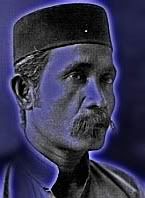15. How to...Tebèng
Somehow you have to tabék (salute) those who tebèng, but tebèng is a perilous word that deserves credit as much as a whack on the head. Now, there’s drama and pathos and bathos all wrapped into one in these words: “Dok kata döh takdi tu, tapi dok tebèng jjugök!” and aficionados of Trengganuspeak will savour the way that the last word jjugök is used as an emphasising raised terminal or dipped in a flat mournful tone for scahdenfreude mixed with uncertain regret.
Whether tebèng is an act of folly or the pursuit of the stout-hearted is open to debate, but the one quality that makes it stand out is its willingness to persist. Sometimes the word babé comes to mind, as in a child who doesn’t listen to the wise words of his Mother, or an adult who, knowing the odds against his ability to make it to the top of the stairs, huffs and puffs and stops midway for the Ventolin to be sent up. Babé is the cousin of tekök and are both stubborn, not-listening-to-wise-counsel words. They are endemic among adults and kids, but nothing babéd nothing won, nothing tebénged nothing got, if only a smack where it hurts. While kids will only look in wonder, you can almost hear now the words of head-shaking adults rushing up with the Ventolin puff, Hör babé tu, nök tebèng jjugok! What a stubborn old goat you are, pushing yourself like that!
There are things that you can tebèng for yourself should you be so disposed. One is tuah which requires a screw-driver to prise open an old safe, another is a bitter concoction that’s supposedly good if poured down your throat. It is tempting here to say that it is not advisable to pour down the old throat an even older concoction found in an old safe, but that will only bring the presumption that it is commendable to be prising open an old safe in the first place. To tebèng really for its own sake you must leave moral conundrums to mindful others, what is required of you is a single, persistent, determined act.
Before scientific method came to Trengganu, it was tebèng that moved ahead. No sailor would have gone out to sea in a raft of weeds without the companionship of tebèng and it is the stout-hearted not the kèngè lad who wins fair maids. And then the sun faded behind the storm clouds and all the housewife had was just fish and some sago dust in the pantry and salt to flavour the mix. So she pounded and persisted and rolled and tried even more when her husband scoffed at her work. And still unsure of the result, she threw the lot into the boiling water that her husband was preparing to mix into his bath to assuage the chills of the monsoon gusts.
That was tebèng in action, and of the first kerepok lekör, out of the bath-water and into the plate.
Labels: babe, kerepok lekor, tebeng, tekok

